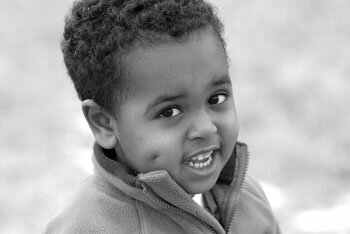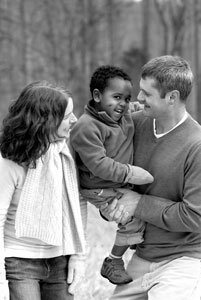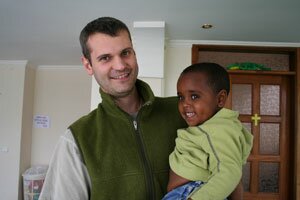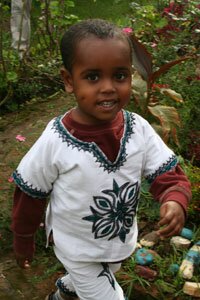FAMILY- Bringing Brehanu home: Starting life anew half a world away
When Kim Wendel and Dustin Bugg boarded an Air Ethiopia flight on August 30, 2006 in Washington, D.C., they knew that although it was a round-trip flight, they'd never return to the life they'd known. Instead of a married couple, they'd be coming home a family, parents of a two-year-old boy named Brehanu whom they knew only through the photographs and written descriptions in his adoption file.
"I thought I'd be scared to death," says Bugg, "but it actually turned out that once we were ready to travel, we were totally psyched."
It was exactly a year earlier thatWendel and Bugg decided to adopt. The couple– married since 2002– hadn't struggled with infertility, nor did they have their own biological children, as is the case for many adoptive parents. Instead, Wendel says, the idea that they would adopt " popped into my head" in August 2005. Creating a multi-cultural family appealed to her, and Wendel says that since Bugg's sister is married to a man from Ethiopia, that small country in the Horn of Africa seemed a natural choice.
While some people consider international adoption, particularly from third-world countries, a "humanitarian effort," Wendel is reluctant to describe her decision that way. "That's part of it," she says, "but it wasn't a big 'save the world' thing. It's more intimate than that. It was making our twosome a threesome."
But deciding to adopt and following through with it are two very different things, Wendel and Bugg soon learned. To initiate the process, they contacted a Minnesota adoption agency Wendel discovered online and began the lengthy approval process. While anyone can legally bear a biological child with no questions asked, parents interested in adopting a child– either domestically or internationally– must undergo rigorous screening to prove their physical, psychological and financial fitness. State law requires that a social worker conduct several home visits, that prospective parents write an extensive autobiograpy including how they themselves were parented, that they turn over financial documents, and that they provide fingerprints for federal approval.
"There are times you feel crabby that you have to prove you're healthy and financially fit," says Wendel. But most of the time, she believed "the end would justify the means," she says.
In addition to the state process, prospective adoptive parents must apply to the federal government for permission to bring their new child into the country.
Though Wendel and Bugg had initially requested a boy younger than one year, over the course of the nine-month approval process they began looking at a list of available children provided by the adoption agency. Many of the children on that list had either some health issue or were older than adoptive parents typically prefer. Wendel and Bugg also learned that simply being a boy can land a child on the list, since girls are statistically much preferred by adoptive families. A 2004 article on Slate.com explores that trend in depth using data from the federal Immigration and Naturalization Service and reveals that for every 100 girls adopted internationally, only 56 boys find homes.
Though the information offered on the waiting children was sparse– name, age, and a brief description– Wendel and Bugg felt drawn to a two-year-old boy born November 20.
"Both of our birthdays are in November, and we met and got married in November," Wendel explains. Brehanu's short description further charmed them: "what chubby cheeks!"
When they expressed interest and saw his photo for the first time, Wendel says, she and Bugg both wept.
"He looked so sad," she says, choking up again at the memory.
Their decision was made.
Wendel and Bugg arrived in Ethiopia on a Thursday night. On Friday morning they were driven the one mile between their guest house, provided by the orphanage, and the children's quarters.
"Dustin spotted him first," says Wendel, recalling Brehanu wearing a green fleece and jeans and standing at the end of a line of children looking out a window at the arriving van.
"We snatched him up and gave him a big hug," she recalls. The warm feelings were reciprocal. From the beginning, Wendel says, "He was pretty affectionate."
As the children ate lunch around a low table, Wendel and Bugg were charmed when Brehanu dropped a biscuit out of reach, then used his feet to grab it.
"We thought he was pretty resourceful," she laughs.
They visited several times over that weekend, and on Sunday, Brehanu moved to the guest quarters with his new parents.
"It was hard," she admits. "He was scared."
Though orphanages in some part of the world are overcrowded, Wendel says she was impressed with the care the orphans receive in Ethiopia.
"Ethiopian people cherish kids," she says, citing the ratio of children to caregivers in the orphanage, which is operated by the adoption agency, as 1:2 for babies and toddlers and 1:3 for the older children. Everyone from the nannies to the drivers is affectionate and loving with their charges, she says, another reason she believes Ethiopia is becoming a popular country for adoptions. Indeed, the number of Ethiopian orphans coming into the U.S. has nearly doubled recently, from 440 in 2005 to more than 731 in 2006. (That number, however, pales compared to the number of adoptions from China: 7,906 in 2005, according to figures from the U.S. State Department.)
In addition to spending time playing at the orphanage, Wendel and Bugg took a daytrip to Brehanu's birthplace near the Ethiopian city of Hossana, an experience they call both "amazing" and "overwhelming." Both decline to discuss the details of Brehanu's life before the orphanage. "That's his story," says Wendel. "He can decide how to share that when he's older."
On the following Friday, eight days after they'd arrived, Wendel and Bugg prepared to bring Brehanu home.
"They have a goodbye ceremony for the kids," says Wendel. "They give them a gift of a traditional outfit, the older kids sing songs, and the nannies say a prayer. Families get to say thank you, and everybody cries."
Following the ceremony, Wendel, Bugg, and Brehanu flew home to start their new life.
But despite strong support from friends and family, the first few months at home were anything but easy.
"Difficult beyond our wildest imagination," says Bugg.
Social workers had warned the couple how hard it would be on their relationship, as well as the fact that it takes time to bond. But Bugg and Wendel says they didn't understand how profound the life change would be until they were living it.
"You have to make a lot of sacrifices on a lot of levels," says Bugg, but he's quick to add that six months in, "Everybody's starting to be more comfortable with their role in the family."
"Sometimes it can feel like an arranged marriage," Wendel says of the early period with Brehanu. "It takes time to grow the love between the two parties. There's an expectation about how you're going to feel about your kid when you're a new mommy. It doesn't always kick in right away."
It does kick in eventually, however.
Now, says Wendel, "I'm smitten," and six months after he arrived, Brehanu has adapted well to life in America.
Wendel took 12 weeks of leave, nine of those unpaid, from her job at UVA to adjust to motherhood. When Wendel returned to work, Bugg took an additional four weeks off to help their son's adjustment to his new life. Brehanu has been attending preschool since January where, Wendel says, he's thriving.
Charlottesville as a community has been welcoming, Wendel says, and she's relieved they haven't had to deal with any insensitive "Brangelina" celebrity adoption comments.
Bugg says watching Brehanu's language skills "explode" has been thrilling. "He went from not knowing what letters and numbers are to singing the ABC song," he says.
Though the adjustment was hard for her and Bugg, both recognize that Brehanu endured the biggest upheaval.
"I can't believe the amount of change he's experienced with such aplomb," Wendel says. "That he trusted two people to shuttle him across the world and take care of him... it's amazing."

PHOTO BY JEN FARIELLO

PHOTO BY JEN FARIELLO

From the beginning, Brehanu– seen here in the orphanage with his father, Dustin Bugg– was "very affectionate."
PHOTO COURTESY KIM WENDEL AND DUSTIN BUGG

Before Brehanu left for America, the orphanage gave him a traditional Ethiopian outfit.
PHOTO COURTESY KIM WENDEL AND DUSTIN BUGG
#